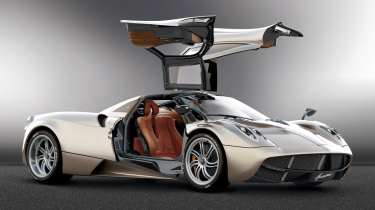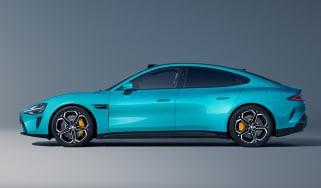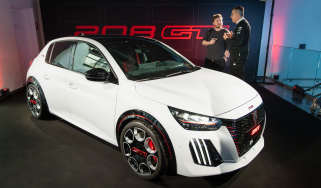New Pagani Huayra video, price and specs
Pictures, video and specs of the Pagani Huayra, which joins the Zonda in the Italian supercar range
The Pagani Huayra is the Italian supercar maker's 700bhp successor to the Zonda. The new creation from Pagani is powered by a 6.0-litre twin-turbo V12 made exclusively for the car by AMG, a company better known for making Mercedes muscle cars. The 12-cylinder engine is mated to a seven-speed automated manual gearbox which weighs less than a double clutch transmission and helps keep the overall kerb weight down to just 1350kg – the same as a Ford Focus ST.
The Huayra is a bit more powerful than the fast Ford though. Well, it’s actually three times more powerful. The V12’s twin-turbocharging differentiates it from its naturally aspirated forebears, and as a result it produces more power than standard specification Zondas. With 720bhp and a staggering 737lb ft of torque, it makes way for few rivals, surpassed by only the Bugatti Veyron, Koenigsegg One:1 and the current crop of hybrid hypercars, the LaFerrari, McLaren P1 and Porsche 918 Spyder. Such power endows the Huayra with a 224mph top speed, which arrives via a 3.3sec 0-60 time.
Active suspension and, even more intriguingly, active aerodynamics have both been developed for the Huayra. Adjustable-height front suspension allows the gap between car and road to be controlled by a powerful new ECU. So for example under heavy braking, the suspension is raised to counter the forward weight transfer.
The aerodynamic character of the car isn’t defined by a bold front splitter, instead being dictated by curious front air scoops. The lack of a conventional front air dam isn’t the only surprise in the Huayra’s front section, as just behind the leading edge of the nose, sitting flush with the surrounding bodywork, are two moveable flaps. These hold the key to the car’s clean profile, as the Huayra sees the introduction of advanced active aerodynamics to the world of supercars. There are two similar flaps at the rear of the car and all four are controlled by that ECU, which constantly monitors speed, yaw, lateral acceleration, steering angle and throttle position and then moves the flaps independently, according to whatever aero load is required. When the car is moving, they dance and move around in a beautifully fluid way.
The Huayra is made of more than 4000 components, not including the engine and gearbox. It is bigger than the Zonda, with a 70mm-lengthier wheelbase and the cabin moved back 40mm back. It’s more spacious, and with Pagani’s extravagant interior design process (and its clever use of glass) it feels huge. With glass panels above you flooding light in, it feels like a targa or a convertible when the sun is shining.
The interior itself is an awe-inspiring cocktail of carbon, leather and exposed metal, the combined effect being to create an environment that could be enjoyed even if you ran out of petrol. Just like the Ferrari 458 Italia, the Huayra’s steering wheel possesses lots of controls (namely the lights, windscreen wipers and Pagani’s interpretation of the manettino switch, which alters both the electronic stability control and gearbox settings, allowing the driver to choose between Normal, Sport and Race modes). The automated manual tranmission’s gearchange paddles are mounted on the wheel rather than on the column, while the gear selector itself is a minor work of art, with design and detailing far more elaborate than the shift between park, reverse, neutral and drive might perhaps deserve.
The fanatical attention to detail that has gone into this car is further evidenced by the Huayra’s instruments. Their facias are hand-made for Pagani by a Swiss watch-face maker in metal, with the numerals and markings cut from the metal face itself. They take days to create and instead of costing the industry standard of around 4 euros, they come in at over 2500 euros a set!
Another highlight is the Huayra’s unique ‘key’; shaped like the car itself and made from aluminium, not only does it start the engine, it also doubles as a music storage device, so every time it’s plugged into the car, all of your tunes become available. Best of all, it actually needs to be inserted and turned, endowing the car with a tactility not yielded by modern-day starter buttons.The level of detail is as beautiful as we have come to expect from the small Italian manufacturer, with the exposed carbonfibre weave matching immaculately between components. Mind you, the car needs to feel pretty special as it costs more than the McLaren P1 and Porsche 918, and sits roughly on par with the LaFerrari; Pagani asks for around £1million if you want a Huayra, and that’s presumably before you’ve got carried away ensuring yours looks completely unique. Mind, compared to the new £2.3million Zonda Revolucion, it’s something of a bargain. Pagani’s first supercar may have been ‘replaced’, but the special versions continue and they’re even wilder than before…




